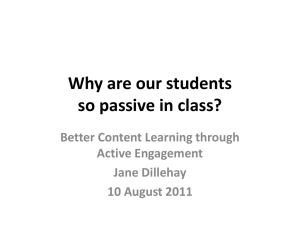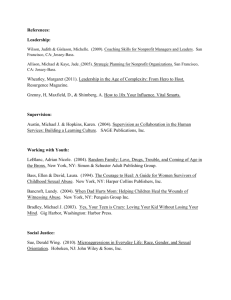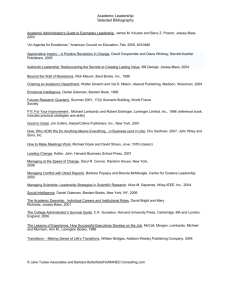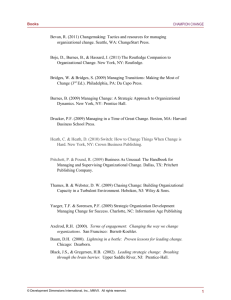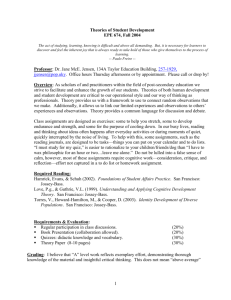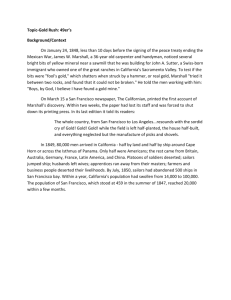(EDG 665) Syllabus of Record: Educational Leadership
advertisement
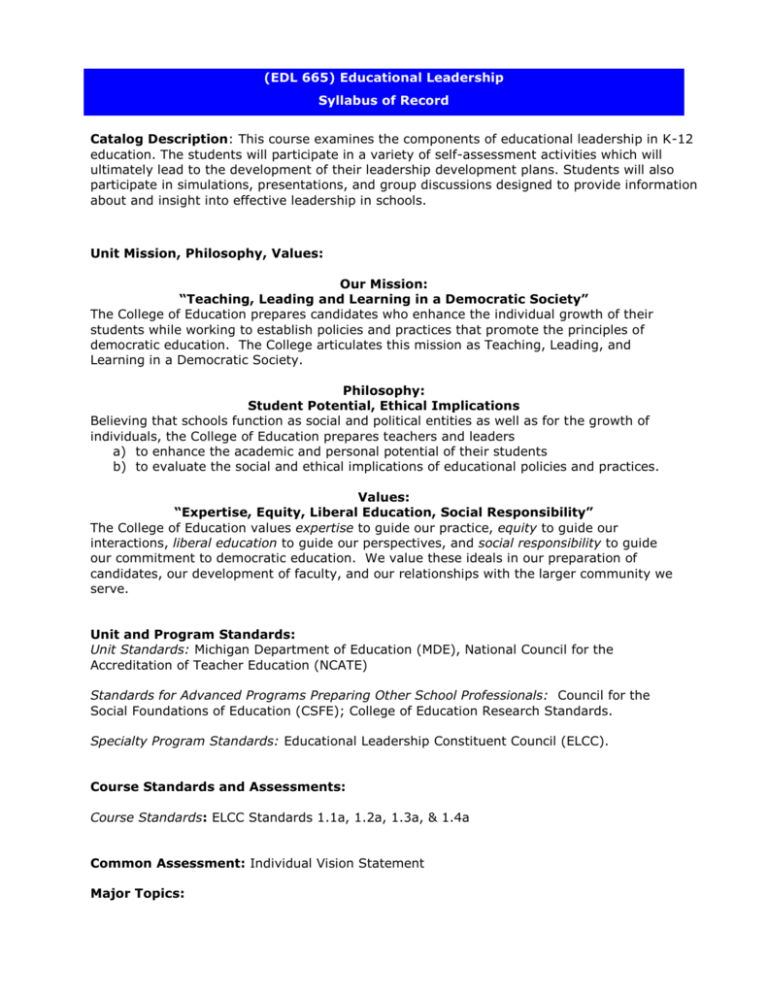
(EDL 665) Educational Leadership Syllabus of Record Catalog Description: This course examines the components of educational leadership in K-12 education. The students will participate in a variety of self-assessment activities which will ultimately lead to the development of their leadership development plans. Students will also participate in simulations, presentations, and group discussions designed to provide information about and insight into effective leadership in schools. Unit Mission, Philosophy, Values: Our Mission: “Teaching, Leading and Learning in a Democratic Society” The College of Education prepares candidates who enhance the individual growth of their students while working to establish policies and practices that promote the principles of democratic education. The College articulates this mission as Teaching, Leading, and Learning in a Democratic Society. Philosophy: Student Potential, Ethical Implications Believing that schools function as social and political entities as well as for the growth of individuals, the College of Education prepares teachers and leaders a) to enhance the academic and personal potential of their students b) to evaluate the social and ethical implications of educational policies and practices. Values: “Expertise, Equity, Liberal Education, Social Responsibility” The College of Education values expertise to guide our practice, equity to guide our interactions, liberal education to guide our perspectives, and social responsibility to guide our commitment to democratic education. We value these ideals in our preparation of candidates, our development of faculty, and our relationships with the larger community we serve. Unit and Program Standards: Unit Standards: Michigan Department of Education (MDE), National Council for the Accreditation of Teacher Education (NCATE) Standards for Advanced Programs Preparing Other School Professionals: Council for the Social Foundations of Education (CSFE); College of Education Research Standards. Specialty Program Standards: Educational Leadership Constituent Council (ELCC). Course Standards and Assessments: Course Standards: ELCC Standards 1.1a, 1.2a, 1.3a, & 1.4a Common Assessment: Individual Vision Statement Major Topics: ■ ■ ■ ■ ■ ■ ■ ■ Leadership Theory Leadership Vision Leadership Skill Analysis Professional Development Planning Communication Skills Time Management Problem Analysis Conflict Management Course Knowledge Base: Bennis, W. and Nanus, B. (1985) Leaders. New York: Harper and Row. Bennis, W. (1998). On becoming a leader. New York: Harper and Row. Berry, J.E. (1995, February). Reorganizing a district to support education The School Administrator, 52 (2), 39. outcomes. Blanchard, K. and Hersey, P. (1985) Organizational change through effective leadership. New York: William Morrow and Company, Inc. Blanchard, K. and Peale, N. (1985) The power of ethical management. New York: William Morrow and Company, Inc. Blanchard, K. and Hersey, P. (1996) Management or organizational behavior utilizing human resources. (Seventh Edition). New York: William Morrow and Company, Inc. Blanchard, K. and O’Conner, M. (1997) Managing by values. New York: William Morrow and Company, Inc. Blanchard, K. and Bowles, S. (1998) Gung ho! New York: William Morrow and Company, Inc. Block, P. (1993) Stewardship. San Francisco, CA: Berrett-Koehler Publishing, Inc. Block, P. (1995) The empowered manager. San Francisco, CA: Berrett-Koehler Publishing, Inc. Bridges, E.M. (1992) Problem based learning for administrators. Eugene, OR: ERK Clearinghouse on Educational Management. Burns, J.M. (1979) Leadership. New York: Harper & Row. Burrello, L.C. & Reitzug, U.C. (1993) Transforming context and developing culture in schools, Journal of Counseling and Development, 71, 669-677. Ciampa, D. and Watkins, M. (1999) Right from the start: Taking charge in a leadership role. Boston, Mass: HarvardBusiness School Press. Collaborative Communications Group. (2001) Standard for What Principals Should Know and Be Able to Do. Alexandria, VA: National Association of Elementary School Principals. Conger, J., Spreitzer, E., & Lawler, E. (1999) A leader’s change Handbook: An essential guide to setting direction and taking action. San Francisco: Jossey-Bass Publishers. Covey, S. (1990) Seven habits of highly effective people. New York, New York: Fireside. Covey, S. (1992) Principle-centered leadership. New York, New York:Fireside. Covey, S. (1994) First things first. New York, New York: Fireside. Deming, W. (1992) Out of the crisis. Cambridge, Mass: Mass. Institute of Technology. DePree, M. (1987) Leadership is an art. New York: Bantam Doubleday Dell. Eisler, R. (1995) From domination to partnership: The hidden subtext for organizational change, Training and Development, 32-40. Evans, R. (2004) Family matters: How schools can cope with the crisis in childrearing. San Francisco, CA: Jossey-Bass. Fiore, D. (2004) Introduction to educational administration. Larchmont, NY: Eye on Education. Frost, C. (1993) Leadership in the new American workplace. East Lansing, State University Press. MI:Michigan Frost, C. (1996) Changing forever. East Lansing, MI.: Michigan State University Press. George, B. (2003) Authentic leadership. San Francisco, CA: Jossey-Bass. Greenleaf, R. and Spears, L. (1998) The power of servant-leadership. New York: – Koehler Publishing. Berrett Gupton, S. (2003) The instructional leadership toolbox: A handbook for improving practice. Thousand Oakes, CA: Corwin Press. Hill P.T. and Bonan, J. (1991) Site-based decision making: Decentralization and accountability. The education digest. pp.22-25. Giulliani, R. (2002) Leadership. New York: Miramax Books. Hughes, L. (2005). Current issues in School leadership. Mahwah, NJ: Lawrence Erlbaum Associates, Inc. Johnson, S. (1998) Who moved my cheese? An amazing way todeal with change in your work and in your life. New York, New York: G.P. Putnam and Sons. Kotter, J. (1996) Leading change. Boston, Mass: Harvard Business School Press. Kouzes, J. and Poshner, B. (1999) Encouraging the heart: A leader’s guide to rewarding and recognizing others. SanFrancisco, CA: Jossey-Bass. Kouzes, J. and Posner, B. (1997) The leadership challenge. San Francisco, CA: JosseyBass. Lambert, L. (2003) Leadership capacity for lasting school improvement. VA: ASCD. Alexandria, Margulus, L. and Melin, J. (2004) Performance appraisals made easy: Tools for evaluating teachers and support staff. Thousand Oaks, CA: Corwin Press. Marzano, R., Waters, T., and McNulty, B. (2005) School leadership that works:From research to results. Alexandria, VA.: ASCD. Maxwell, J. (1993) Developing the leader within you. New York: Thomas Nelson. Maxwell, J. (1998) The 21 irrefutable laws of leadership: Follow them and people will follow you. New York: Thomas Nelson. Maxwell, J. (1999) The 21 indispensable qualities of a leader: Becoming the person others will want to follow. New York: Thomas Nelson. McNally, D. (1990) Even eagles need a push. New York: Bantam Doubleday Dell. McNally, D. (1998) The eagles’ secret. New York: Bantam Doubleday Dell. Meek, A. (1999) Communicating with the public: A guide for school leaders. Alexandria, VA: Association for Supervision and Curriculum Development. Morgan, A. and Lynch, C. (2006) Leading from the front. New York: McGraw-Hill. Murphy, J. (1998) The unheroic side of leadership, Phi Delta Kappan, 69, 659. Nanus, B. (1992) Visionary leadership. San Francisco: Jossey-Bass. Odden, E.R. and Wohlstetter, P. (1995) Making school-based management Educational Leadership. 32-37. work. Ortiz, F.I. and Marshal, C. (1995) Becoming a school leader: The case of women and minorities, People and Education. 3, 83-110. Peters, T. and Austin, N. (1986) A passion for excellence. New York, New York: Warner Books. Peters, T. (1999) The circle of innovation: You can’t shrink your way to greatness. New York: Warner Books. Performance-Based Preparation of Principals of Principals (1985). A special report of the NASSP Consortium for the Performance-Based Preparation of Principals, NASSP, Reston, Virginia. Philips, Donald T. (1993) Lincoln on leadership: Executive strategies for tough times. New York: Warner Books. Proficiencies for principals, NAESP (1986). Alexandria, VA. Reichfield, F. (1996) The Loyalty Effect. Boston, Mass: Harvard Business School Press. Schwahn, C. and Spady, W. (1998) Total leaders: Applying the best future-focused change strategies to education. AASA Distribution Center. Senge, P. (1990) The fifth discipline. New York: Bantam Doubleday Dell. Senge, P. (1994) The fifth discipline fieldbook. New York: Bantam Doubleday Dell. Sergiovanni, T.J. (1996) Leadership for the schoolhouse: How is it different? Why is itimportant? San Francisco: Jossey-Bass.
